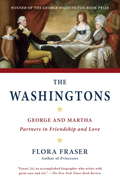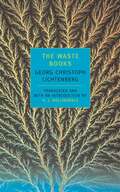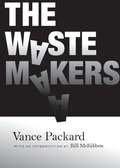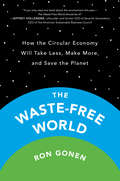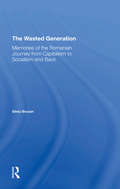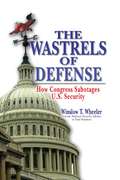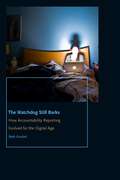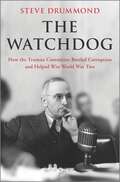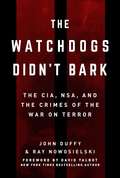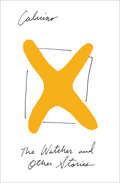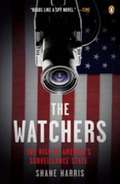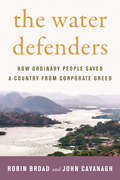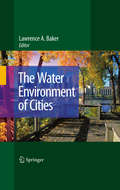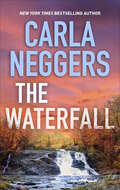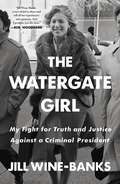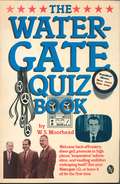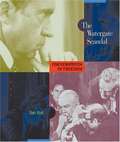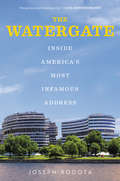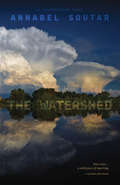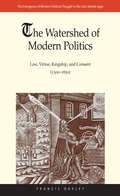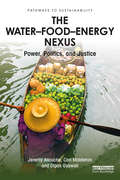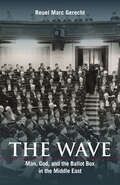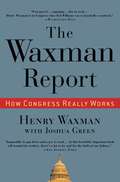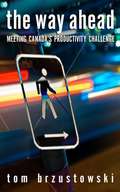- Table View
- List View
The Washingtons
by Flora FraserA full-scale portrait of the marriage of the father and mother of our country--and of the struggle for independence that he led The Washingtons' long union begins in colonial Virginia in 1759, when George Washington woos and weds Martha Dandridge Parke Custis, a pretty, charming, and very rich young widow. The calm early years of their marriage as plantation owners at Mount Vernon and as parents to Martha's two children, Jacky and Patsy--both of whom present difficult challenges--yield to harsher times. Washington has been prominent among Virginians in opposing British government measures, and at the outbreak of fighting in 1775 he is elected commander-in-chief of the Continental army. The war sees Martha resolutely supporting her husband, sharing in the hardships at Valley Forge and other wretched winter headquarters. Essential to George's personal well-being, she is known as "Lady Washington"--a redoubtable and vastly admired figure in her own right.Flora Fraser provides us with a brilliant account of the public Washington and of the war he waged, and gives us, as well, the domestic Washingtons, whether at Mount Vernon before and during the war or in New York and Philadelphia during his presidency. Even in wartime, Martha manages to scour Philadelphia to find a doll for her newest granddaughter and keeps careful control of her Virginia inheritance. George grapples with a formidable enemy, without proper troops and often without basic supplies--his soldiers frequently lack rations, blankets, even shoes--while always fearful for his wife's welfare and safety, given the constant worry that the British might descend on Mount Vernon. Even so, a true Virginian, he manages to dance for more than three hours with Alexander Hamilton's pretty young wife at a makeshift ball.With victory and the arrival of peace in 1783, the Washingtons hope to remain at home, a hope dashed when, in 1789, George is elected our first president and Martha becomes a faultless first First Lady. During the presidency, they together negotiate the many pitfalls of establishing republican entertainment--the weekly "Congress dinner," levées, and drawing rooms--before, finally free of official responsibilities after Washington's second term, they are at last able to retreat to their beloved Mount Vernon.This is a remarkable story of a remarkable pair as well as a gripping narrative of the birth of a nation--a major, and vastly appealing, contribution to the literature of our founding fathers . . . and founding mother.From the Hardcover edition.
The Waste Books
by Georg Christoph LichtenbergGerman scientist and man of letters Georg Christoph Lichtenberg was an 18th-century polymath: an experimental physicist, an astronomer, a mathematician, a practicing critic both of art and literature. He is most celebrated, however, for the casual notes and aphorisms that he collected in what he called his Waste Books. With unflagging intelligence and encyclopedic curiosity, Lichtenberg wittily deflates the pretensions of learning and society, examines a range of philosophical questions, and tracks his own thoughts down hidden pathways to disconcerting and sometimes hilarious conclusions. Lichtenberg's Waste Books have been greatly admired by writers as very different as Tolstoy, Einstein, and Andre Breton, while Nietzsche and Wittgenstein acknowledged them as a significant inspiration for their own radical work in philosophy. The record of a brilliant and subtle mind in action, The Waste Books are above all a powerful testament to the necessity, and pleasure, of unfettered thought. Read less
The Waste Makers
by Bill Mckibben Vance PackardAn exposé of "the systematic attempt of business to make us wasteful, debt-ridden, permanently discontented individuals," The Waste Makers is Vance Packard's pioneering 1960 work on how the rapid growth of disposable consumer goods was degrading the environmental, financial, and spiritual character of American society. The Waste Makers was the first book to probe the increasing commercialization of American life--the development of consumption for consumption's sake. Packard outlines the ways manufacturers and advertisers persuade consumers to buy things they don't need and didn't know they wanted, including the two-of-a-kind of everything syndrome--"two refrigerators in every home"--and appeals to purchase something because it is more expensive, or because it is painted in a new color. The book also brought attention to the concept of planned obsolescence, in which a "death date" is built into products so that they wear out quickly and need to be replaced. By manipulating the public into mindless consumerism, Packard believed that business was making us "more wasteful, imprudent, and carefree in our consuming habits," which was using up our natural resources at an alarming rate. A prescient book that predicted the rise of American consumer culture, this all new edition of The Waste Makers features an introduction by best-selling author Bill McKibben. Vance Packard (1914-1996) was an American journalist, social critic, and best-selling author. Among his other books were The Hidden Persuaders, about how advertisers use psychological methods to get people to buy the products they sell; The Status Seekers, which describes American social stratification and behavior; and The Naked Society, about the threats to privacy posed by new technologies.
The Waste-Free World: How the Circular Economy Will Take Less, Make More, and Save the Planet
by Ron GonenThe next revolution in business will provide for a sustainable future, from founder, CEO and circular economy expert Ron GonenOur take-make-waste economy has cost consumers and taxpayers billions while cheating us out of a habitable planet. But it doesn&’t have to be this way. The Waste-Free World makes a persuasive, forward-looking case for a circular economic model, a &“closed-loop&” system that wastes no natural resources. Entrepreneur, CEO and sustainability expert Ron Gonen argues that circularity is not only crucial for the planet but holds immense business opportunity. As the founder of an investment firm focused on the circular economy, Gonen reveals brilliant innovations emerging worldwide— &“smart&” packaging, robotics that optimize recycling, nutrient rich fabrics, technologies that convert food waste into energy for your home, and many more. Drawing on his experience in technology, business, and city government and interviews with leading entrepreneurs and top companies, he introduces a vital and growing movement. The Waste-Free World invites us all to take part in a sustainable and prosperous future where companies foster innovation, investors recognize long term value creation, and consumers can align their values with the products they buy.
The Wasted Generation: Memoirs Of The Romanian Journey From Capitalism To Socialism And Back
by Silviu BrucanMy generation in Eastern Europe was caught in the middle of two revolutions (1944 and 1989), which instead of moving history ahead pushed it backward. We thus at first made a U-turn-a tortuous one, to be sure-from underdeveloped capitalism to underdeveloped socialism, but because socialism and underdevelopment are strange bedfellows,we have since discovered we were on the wrong path and are trying now to return to where we started. The drama of that generation is what this book is about.
The Wastrels of Defense
by Winslow T. WheelerIn this damning expose, a veteran senate defense advisor argues that since Sept 11, 2001, the conduct of the U.S. Congress has sunk to new depths and endangered the nation's security. Winslow Wheeler draws on three decades of work with four prominent senators to tell in lively detail how members of Congress divert money from essential war-fighting accounts to pay for pork in their home states, cook the budget books to pursue personal agendas, and run for cover when confronted with tough defense issues. With meticulous documentation to support his claims, he contends that this behavior is not confined to one party or one political philosophy. He further contends that senators who sell themselves as reformers and journalists covering Capitol Hill are simply not doing their jobs. Pork is far from a new phenomenon in Washington, yet most Americans fail to understand its serious consequences. Wheeler knows the harm it does and challenges citizens to take action against lawmakers pretending to serve the public trust while sending home the bacon. Dubbed a "Hill Deep Throat" who participated in the game he now criticizes, he fills his book with evidence of Congressional wrongdoing, naming names and citing specific examples. Pointing to the extremes that have become routine in the legislative process, he focuses on defense appropriations and Congress's willingness to load down defense bills with pork, in some cases with the Pentagon's help. On the question of deciding war, he accuses today's members of Congress of lacking the character of their predecessors, often positioning themselves on both sides of the question of war against Iraq without probing the administration's justifications. Wheeler concludes with a model for reform that he calls twelve not-so-easy steps to a sober Congress.
The Watchdog Still Barks: How Accountability Reporting Evolved for the Digital Age (Donald McGannon Communication Research Center's Everett C. Parker Book Series)
by Beth KnobelPerhaps no other function of a free press is as important as the watchdog role—its ability to monitor the work of the government. It is easier for politicians to get away with abusing power—wasting public funds and making poor decisions—if the press is not shining its light with what is termed “accountability reporting.” This need has become especially clear in recent months, as the American press has come under virulent direct attack for carrying out its watchdog duties. Upending the traditional media narrative that watchdog accountability journalism is in a long, dismaying decline, The Watchdog Still Barks presents a study of how this most important form of journalism came of age in the digital era at American newspapers.Although the American newspaper industry contracted significantly during the 1990s and 2000s, Fordham professor and former CBS News producer Beth Knobel illustrates through empirical data how the amount of deep watchdog reporting on the newspapers’ studied front pages generally increased over time despite shrinking circulations, low advertising revenue, and pressure to produce the kind of soft news that plays well on social media. Based on the first content analysis to focus specifically on accountability journalism nationally, The Watchdog Still Barks examines the front pages of nine newspapers located across the United States to paint a broad portrait of how public service journalism has changed since 1991 as the advent of the Internet transformed journalism. This portrait of the modern newspaper industry shows how papers of varying sizes and ownership structures around the country marshaled resources for accountability reporting despite significant financial and technological challenges.The Watchdog Still Barks includes original interviews with editors who explain why they are staking their papers’ futures on the one thing that American newspapers still do better than any other segment of the media: watchdog and investigative reporting.
The Watchdog: How the Truman Committee Battled Corruption and Helped Win World War Two
by Steve DrummondThe story of how a little-known junior senator fought wartime corruption and, in the process, set himself up to become vice president and ultimately President Harry Truman. Months before Pearl Harbor, Franklin D. Roosevelt knew that the United States was on the verge of entering another world war for which it was dangerously ill-prepared. The urgent times demanded a transformation of the economy, with the government bankrolling the unfathomably expensive task of enlisting millions of citizens while also producing the equipment necessary to successfully fight—all of which opened up opportunities for graft, fraud and corruption. In The Watchdog, Steve Drummond draws the reader into the fast-paced story of how Harry Truman, still a newcomer to Washington politics, cobbled together a bipartisan team of men and women that took on powerful corporate entities and the Pentagon, placing Truman in the national spotlight and paving his path to the White House. Drawing on the largely unexamined records of the Truman Committee as well as oral histories, personal letters, newspaper archives and interviews, Steve Drummond—an award-winning senior editor and executive producer at NPR—brings the colorful characters and intrigue of the committee&’s work to life. The Watchdog provides readers with a window to a time that was far from perfect but where it was possible to root out corruption and hold those responsible to account. It shows us what can be possible if politicians are governed by the principles of their office rather than self-interest.
The Watchdogs Didn't Bark: The CIA, NSA, and the Crimes of the War on Terror
by John Duffy Ray NowosielskiThe Shocking Reexamination of Unexplored Failures by Government Officials to Use Available Intelligence to Stop the Events of September 11th In 2009, documentarians John Duffy and Ray Nowosielski arrived at the offices of Richard Clarke, the former counterterror adviser to Presidents Clinton and Bush. In the meeting, Clarke boldly accused one-time Central Intelligence Agency director George Tenet of “malfeasance and misfeasance” in the pre-war on terror. Thus began an incredible—never-before-told—investigative journey of intrigue about America’s intelligence community and two 9/11 hijackers. The Watchdogs Didn’t Bark details that story, unearthed over a ten-year investigation. Following the careers of a dozen counterterror employees working in different agencies of the US government from the late 1980s to the present, the book puts the government’s systems of oversight and accountability under a microscope. At the heart of this book is a mystery: Why did key 9/11 plotters Khalid Al Mihdhar and Nawaf Al Hazmi, operating inside the United States, fall onto the radars of so many US agencies without any of those agencies succeeding in stopping the attacks? The answers go beyond mere “conspiracy theory” and “deep state” actors, but instead find a complicated set of potential culprits and an easily manipulated system. Taking readers on a character-driven account of the causes of 9/11 and how the lessons of the attacks were cynically inverted to empower surveillance of citizens, kidnapping, illegal imprisonment, torture, government-sanctioned murder, and a war on whistleblowers and journalists, an alarm is raised which is more pertinent today than ever before.
The Watcher and Other Stories
by Italo CalvinoThis collection of three long stories by the author of Cosmicomics “demonstrates clearly his talent for transforming the mundane into the marvelous” (The New York Times).Italo Calvino is widely recognized as one of postwar Italy’s greatest fiction writers and one of the twentieth century’s greatest fabulists. This collection of three stories showcases his range and virtuosity.In the title story, an Italian Communist poll watcher is stationed at a hospital in Turin, where nuns guide the hands of invalids to their preferred candidate in a special election. In “Smog,” a city’s cooperative laundry facility reveals a harbinger of social purification. And in “The Argentine Ant,” the citizens of a provincial seaside town struggle against a government-controlled infestation.“Like Jorge Luis Borges and Gabriel García Márquez, Italo Calvino dreams perfect dreams for us.” —John Updike, New Yorker
The Watchers
by Shane HarrisAn explosive look at the domestic agencies charged with spying on all of us. Given recent terrorist events in the U. S. , this timely book draws on access to political and operational insiders to create a brilliant exposé of why and how the American government spies on citizens. Born in the wake of the 1983 massacre of 241 Marines in Beirut, the plan by Ronald Reagan's national security advisor, John Poindexter, to coordinate intelligence on terrorists has claimed billions of government dollars. Despite the cost, it has failed in its mission to identify new threats. But as Harris shows, it has provided the government with a tool for spying on Americans that has ushered in an age of constitutionally questionable intrusion into the lives of every citizen.
The Watchers
by Shane HarrisUsing exclusive access to key insiders, Shane Harris charts the rise of America's surveillance state over the past twenty-five years and highlights a dangerous paradox: Our government's strategy has made it harder to catch terrorists and easier to spy on the rest of us. Our surveillance state was born in the brain of Admiral John Poindexter in 1983. Poindexter, Reagan's National Security Advisor, realized that the United States might have prevented the terrorist massacre of 241 Marines in Beirut if only intelligence agencies had been able to analyze in real time data they had on the attackers. Poindexter poured government know-how and funds into his dream-a system that would sift reams of data for signs of terrorist activity. Decades later, that elusive dream still captivates Washington. After the 2001 attacks, Poindexter returned to government with a controversial program, called Total Information Awareness, to detect the next attack. Today it is a secretly funded operation that can gather personal information on every American and millions of others worldwide. But Poindexter's dream has also become America's nightmare. Despite billions of dollars spent on this digital quest since the Reagan era, we still can't discern future threats in the vast data cloud that surrounds us all. But the government can now spy on its citizens with an ease that was impossible-and illegal-just a few years ago. Drawing on unprecedented access to the people who pioneered this high-tech spycraft, Harris shows how it has shifted from the province of right- wing technocrats to a cornerstone of the Obama administration's war on terror. Harris puts us behind the scenes and in front of the screens where twenty-first-century spycraft was born. We witness Poindexter quietly working from the private sector to get government to buy in to his programs in the early nineties. We see an army major agonize as he carries out an order to delete the vast database he's gathered on possible terror cells-and on thousands of innocent Americans-months before 9/11. We follow General Mike Hayden as he persuades the Bush administration to secretly monitor Americans based on a flawed interpretation of the law. After Congress publicly bans the Total Information Awareness program in 2003, we watch as it is covertly shifted to a "black op," which protects it from public scrutiny. When the next crisis comes, our government will inevitably crack down on civil liberties, but it will be no better able to identify new dangers. This is the outcome of a dream first hatched almost three decades ago, and The Watchers is an engrossing, unnerving wake-up call.
The Water Defenders: How Ordinary People Saved a Country from Corporate Greed
by Robin Broad John CavanaghThe David and Goliath story of ordinary people in El Salvador who rallied together with international allies to prevent a global mining corporation from poisoning the country's main water sourceAt a time when countless communities are resisting powerful corporations--from Flint, Michigan, to the Standing Rock Reservation, to Didipio in the Philippines, to the Gualcarque River in Honduras--The Water Defenders tells the inspirational story of a community that took on an international mining corporation at seemingly insurmountable odds and won not one but two historic victories.In the early 2000s, many people in El Salvador were at first excited by the prospect of jobs, progress, and prosperity that the Pacific Rim mining company promised. However, farmer Vidalina Morales, brothers Marcelo and Miguel Rivera, and others soon discovered that the river system supplying water to the majority of Salvadorans was in danger of catastrophic contamination. With a group of unlikely allies, local and global, they committed to stop the corporation and the destruction of their home.Based on over a decade of research and their own role as international allies of the community groups in El Salvador, Robin Broad and John Cavanagh unspool this untold story--a tale replete with corporate greed, a transnational lawsuit at a secretive World Bank tribunal in Washington, violent threats, murders, and--surprisingly--victory. The husband-and-wife duo immerses the reader in the lives of the Salvadoran villagers, the journeys of the local activists who sought the truth about the effects of gold mining on the environment, and the behind-the-scenes maneuverings of the corporate mining executives and their lawyers. The Water Defenders demands that we examine our assumptions about progress and prosperity, while providing valuable lessons for those fighting against destructive corporations in the United States and across the world.
The Water Environment of Cities
by Lawrence A. BakerUrbanization of the Earth's population will have increased the Earth's urban population from less than one billion in 1950 to five billion by 2030. Managing water for this burgeoning urban population is one of the critical needs for humanity. This book uses a holistic, interdisciplinary approach to examine the urban water environment. Water has multiple roles: municipal water supply, aquatic habitat, landscape aesthetics and recreation. Increasingly, urban water is reused, serving multiple purposes. Humans alter the urban hydrologic cycle and the chemical and physical integrity of urban water systems and resources. Some of those changes are beneficial, and others harmful. Understanding those changes and impacts requires expertise and perspective from a wide range of disciplines. Chapter authors represent this diversity of expertise, with expertise in surface and groundwater hydrology, civil and environmental engineering, environmental policy, urban planning, law, geomorphology, and recreation management.
The Waterfall: An Anthology (Mira Ser.)
by Carla NeggersA young widow facing a mysterious threat calls on a security expert from her husband’s past in this politically charged romantic suspense novel.Three years after her husband’s death, Lucy Blacker Swift is finally rebuilding her life. After leaving the cutthroat world of Washington, she and her two children are starting over in a quaint Vermont farmhouse. But now unexplained events—late-night hang-ups, a bullet through a window—are threatening her family. Unwilling to contact her father-in-law, Senator Swift, Lucy tracks down the security expert her husband once told her about.Sebastian Redwing wants nothing to do with Lucy’s problems . . . or with a woman he’s been half in love with since her wedding day. But he won’t break his promise to protect her. He soon finds himself drawn into a dangerous tangle of blackmail, vengeance and betrayal, where Lucy’s powerful family—and Sebastian’s troubled past—are impossible to escape.
The Watergate Girl: My Fight for Truth and Justice Against a Criminal President
by Jill Wine-BanksObstruction of justice, the specter of impeachment, sexism at work, shocking revelations: Jill Wine-Banks takes us inside her trial by fire as a Watergate prosecutor. It was a time, much like today, when Americans feared for the future of their democracy, and women stood up for equal treatment. At the crossroads of the Watergate scandal and the women’s movement was a young lawyer named Jill Wine Volner (as she was then known), barely thirty years old and the only woman on the team that prosecuted the highest-ranking White House officials. Called “the mini-skirted lawyer” by the press, she fought to receive the respect accorded her male counterparts—and prevailed.In The Watergate Girl, Jill Wine-Banks opens a window on this troubled time in American history. It is impossible to read about the crimes of Richard Nixon and the people around him without drawing parallels to today’s headlines. The book is also the story of a young woman who sought to make her professional mark while trapped in a failing marriage, buffeted by sexist preconceptions, and harboring secrets of her own. Her house was burgled, her phones were tapped, and even her office garbage was rifled through.At once a cautionary tale and an inspiration for those who believe in the power of justice and the rule of law, The Watergate Girl is a revelation about our country, our politics, and who we are as a society.
The Watergate Quiz Book
by W. S. MoorheadDuring the two-year political circus that was Watergate, were you(1) A junkie, who followed the developments day by day, relishing every sordid detail?(2) A dabbler, who caught up every now and then with the latest revelation?(3) An avoider, who ignored it all as much as possible, assuming that everyone involved was probably guilty of something?If you're in the first group, you're going to love this book, because it's a fact-loaded, comprehensive, and challenging test of your memory. If you're in the second group, you should read this book, to fill in all of the 18½-minute gaps in your knowledge. If you're in the third group, you need this book, because Watergate is too important to remain ignorant about permanently, and this is the only complete history that is enjoyable and that truly captures the spirit of it all.We are in danger of forgetting the greatest American political scandal of this century—and also one of the century's greatest entertainments, starring the man who actually said after it was all over, "I wasn't lying. I said things which later on seemed to be untrue." Decades have passed now, and it's a fine time to look back. The Watergate Quiz Book organizes two years of confusing allegations, revelations, and testimony into ten chronological chapters of nasty, challenging questions: true/false, multiple choice, direct response, and—for Watergate fanatics only—difficult "Deep Throat" questions. Remember the "Rose Mary Stretch"? Did you know which presidential aides were not recruited from the J. Walter Thompson advertising agency's Los Angeles office? Did you ever learn what "Gemstone" was? Operation Sandwedge? Who was the Tickler? Who knew about what, and when? And—biggest question of all—who was Mark Felt, better known as Deep Throat? Test your Watergate I.Q., or learn it all for the first time!
The Watergate Scandal (Cornerstones of Freedom)
by Dan ElishDetails the events of the scandal called Watergate, including the major players, how the facts were uncovered, and the way in which the events ultimately reaffirmed basic principles of the Constitution.
The Watergate: Inside America's Most Infamous Address (G - Reference, Information and Interdisciplinary Subjects)
by Joseph RodotaSince its opening in 1965, the Watergate complex has been one of Washington's chicest addresses, a home to power brokers from both political parties and the epicenter of a scandal that brought down a president. In The Watergate, writer and political consultant Joseph Rodota paints a vivid portrait of this landmark and the movers and shakers who have lived there.Watergate residents—an intriguing casts of politicians, journalists, socialites and spies—have been at the center of America's political storms for half a century. The irrepressible Martha Mitchell, wife of President Nixon's attorney general and campaign manager John Mitchell, captivated the nation with a stream of outrageous interviews and phone calls from her Watergate duplex. Supreme Court justices Ruth Bader Ginsburg and Antonin Scalia put aside their differences many a New Year's Eve to celebrate together at the Watergate, dining on wild game hunted by Scalia and cooked by Ginsburg's husband. Monica Lewinsky hunkered down in her mother's Watergate apartment while President Clinton fought impeachment; her neighbor U.S. Senator Bob Dole brought donuts to the hordes of reporters camped out front. Years after Secretary of State Condoleezza Rice hosted chamber music concerts in her Watergate living room, guests remembered the soaring music—and the cheap snacks.Rodota unlocks the mysteries of the Watergate, including why Elizabeth Taylor refused to move into a Watergate apartment with her sixth husband; reveals a surprising connection between the Watergate and Ronald Reagan; and unravels how the Nixon break-in transformed the Watergate's reputation and spawned generations of "-gate" scandals, from Koreagate to Deflategate.The Washington Post once called the Watergate a "glittering Potomac Titanic." Like the famous ocean liner, the Watergate was ahead of its time, filled with boldface names—and ultimately doomed. The Watergate is a captivating inside look at the passengers and crew of this legendary building.
The Watershed
by Annabel SoutarHow much do we value clean water? Enough to stop our industrialized way of life from degrading it? The documentary play The Watershed follows an artist and her family in the struggle to chart a sustainable course between economic prosperity and environmental stewardship. Annabel Soutar is Canada's foremost documentary theater writer.
The Watershed of Modern Politics
by Francis OakleyThe concluding volume of Francis Oakley's authoritative trilogy moves on to engage the political thinkers of the later Middle Ages, Renaissance, Age of Reformation and religious wars, and the era that produced the Divine Right Theory of Kingship. Oakley's ground-breaking study probes the continuities and discontinuities between medieval and early modern modes of political thinking and dwells at length on the roots and nature of those contract theories that sought to legitimate political authority by grounding it in the consent of the governed.
The Water–Food–Energy Nexus: Power, Politics, and Justice (Pathways to Sustainability)
by Carl Middleton Dipak Gyawali Jeremy AlloucheThe world of development thinkers and practitioners is abuzz with a new lexicon: the idea of "the nexus" between water, food, and energy which is intuitively compelling. It promises better integration of multiple sectoral elements, a better transition to greener economies, and sustainable development. However, there appears to be little agreement on its precise meaning, whether it only complements existing environmental governance approaches or how it can be enhanced in national contexts. One current approach to the nexus treats it as a risk and security matter while another treats it within economic rationality addressing externalities across sector. A third perspective acknowledges it as a fundamentally political process requiring negotiation amongst different actors with distinct perceptions, interests, and practices. This perspective highlights the fact that technical solutions for improving coherence within the nexus may have unintended and negative impacts in other policy areas, such as poverty alleviation and education. The Water–Food–Energy Nexus: Power, Politics and Justice lays out the managerial-technical definitions of the nexus and challenges these conceptions by bringing to the forefront the politics of the nexus, around two key dimensions – a dynamic understanding of water–food–energy systems, and a normative positioning around nexus debates, in particular around social justice. The authors argue that a shift in nexus governance is required towards approaches where limits to control are acknowledged, and more reflexive/plural strategies adopted. This book will be of interest to academic researchers, policy makers, and practitioners in the fields of international development studies, environmental politics, and science and technology studies, as well as international relations.
The Wave: Man, God, and the Ballot Box in the Middle East
by Reuel Marc GerechtMiddle East expert Reuel Marc Gerecht argues that the Middle East may actually be at the beginning of a momentous democratic wave whose convulsions could become the region's defining theme during Obama's presidency. He describes the powerful Middle Eastern democratic movements coming from both the left and right and argues that America must reassess democracy's supposed lack of a future in the region.
The Waxman Report: How Congress Really Works
by Henry Waxman Joshua GreenAt a time when some of the most sweeping national initiatives in decades are being debated, Congressman Henry Waxman offers a fascinating inside account of how Congress really works by describing the subtleties and complexities of the legislative process. For four decades, Waxman has taken visionary and principled positions on crucial issues and been a driving force for change. Because of legislation he helped champion, our air is cleaner, our food is safer, and our medical care better. Thanks to his work as a top watchdog in Congress, crucial steps have been taken to curb abuses on Wall Street, to halt wasteful spending in Iraq, and to ban steroids from Major League Baseball. Few legislators can match his accomplishments or his insights on how good work gets done in Washington. In this book, Waxman affords readers a rare glimpse into how this is achieved-the strategy, the maneuvering, the behind-the-scenes deals. He shows how the things we take for granted (clear information about tobacco's harmfulness, accurate nutritional labeling, important drugs that have saved countless lives) started out humbly-derided by big business interests as impossible or even destructive. Sometimes, the most dramatic breakthroughs occur through small twists of fate or the most narrow voting margin. Waxman's stories are surprising because they illustrate that while government's progress may seem glacial, much is happening, and small battles waged over years can yield great results. At a moment when so much has been written about what'swrongwith Congress-the gridshy;lock, the partisanship, the influence of interest groups-Henry Waxman offers sophisticated, concrete examples of how governshy;ment can (and should) work.
The Way Ahead: Meeting Canada's Productivity Challenge (Governance Series)
by Tom BrzustowskiCanada is a prosperous country, but this prosperity is being stressed by demographics, pressures on the public purse, and low productivity growth. To maintain the nation's high quality of life, prosperity must increase while remaining sustainable. Combining Tom Brzustowski's extensive knowledge of government, industry, and academia, The Way Ahead, articulates a strategy for moving the Canadian economy towards higher-value products based on research and development, describing the practical steps government, industry and academia must take to improve things in the short term and prepare strategically for the long term. He recommends increasing productivity growth by embracing an economy based on innovation, prioritizing research and development, marketing Canadian products internationally, and encouraging entrepreneurial activities in all sectors. Ultimately, increasing prosperity will require a new level of understanding, strategic coherence, and mutual support between the private and public sectors in Canada, a challenge that the author feels Canada is prepared to and absolutely must face.
